Culture and HRM: South Korea Impact on Human Resource Operations
VerifiedAdded on 2022/09/06
|6
|1601
|33
Essay
AI Summary
This essay critically evaluates the influence of cultural determinants in South Korea on Human Resource (HR) operations. It highlights the importance of culture in shaping business activities and the need for companies to understand local cultural factors. The paper focuses on four key cultural dimensions: power distance, masculinity versus femininity, individualism versus collectivism, and uncertainty avoidance, as defined by Hofstede's cultural dimensions theory. It examines how these dimensions impact HR practices, particularly in recruitment, employee relations, and organizational structure, emphasizing the need for companies to adapt their HR strategies to align with South Korean cultural norms. The essay provides a comprehensive analysis of how these cultural factors affect the success of both expatriate managers and host country nationals, emphasizing the need for culturally sensitive HRM approaches.
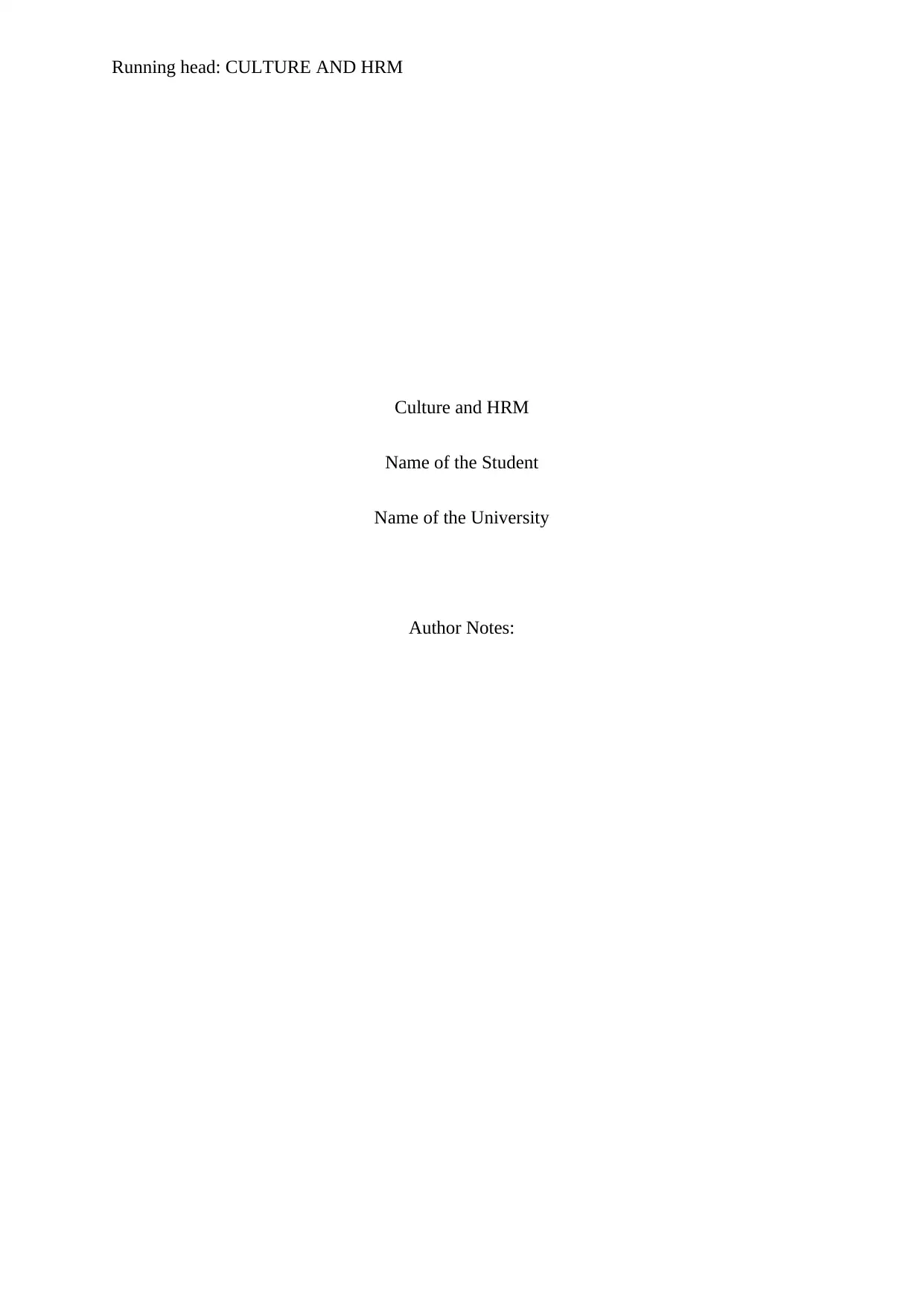
Running head: CULTURE AND HRM
Culture and HRM
Name of the Student
Name of the University
Author Notes:
Culture and HRM
Name of the Student
Name of the University
Author Notes:
Paraphrase This Document
Need a fresh take? Get an instant paraphrase of this document with our AI Paraphraser
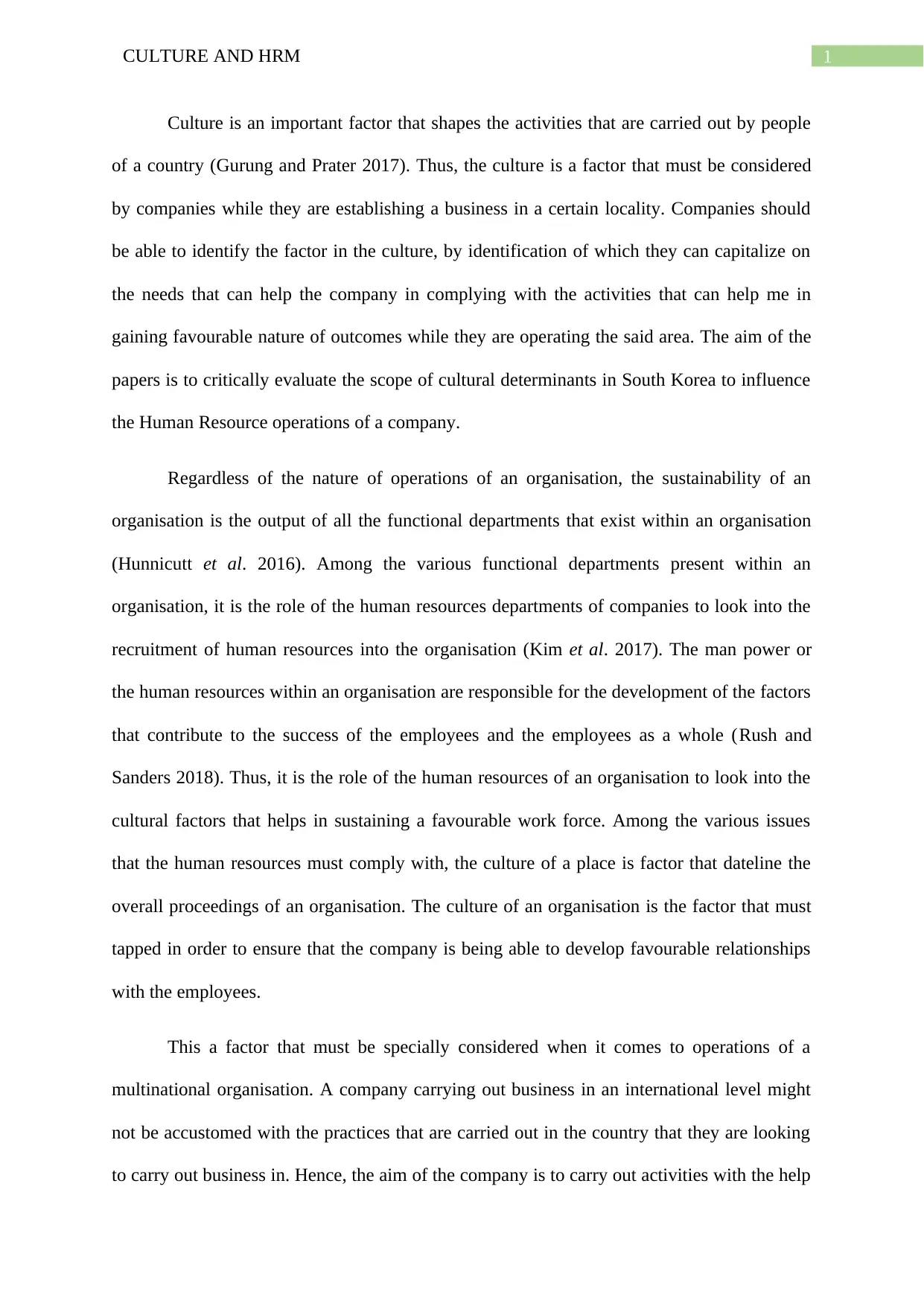
1CULTURE AND HRM
Culture is an important factor that shapes the activities that are carried out by people
of a country (Gurung and Prater 2017). Thus, the culture is a factor that must be considered
by companies while they are establishing a business in a certain locality. Companies should
be able to identify the factor in the culture, by identification of which they can capitalize on
the needs that can help the company in complying with the activities that can help me in
gaining favourable nature of outcomes while they are operating the said area. The aim of the
papers is to critically evaluate the scope of cultural determinants in South Korea to influence
the Human Resource operations of a company.
Regardless of the nature of operations of an organisation, the sustainability of an
organisation is the output of all the functional departments that exist within an organisation
(Hunnicutt et al. 2016). Among the various functional departments present within an
organisation, it is the role of the human resources departments of companies to look into the
recruitment of human resources into the organisation (Kim et al. 2017). The man power or
the human resources within an organisation are responsible for the development of the factors
that contribute to the success of the employees and the employees as a whole (Rush and
Sanders 2018). Thus, it is the role of the human resources of an organisation to look into the
cultural factors that helps in sustaining a favourable work force. Among the various issues
that the human resources must comply with, the culture of a place is factor that dateline the
overall proceedings of an organisation. The culture of an organisation is the factor that must
tapped in order to ensure that the company is being able to develop favourable relationships
with the employees.
This a factor that must be specially considered when it comes to operations of a
multinational organisation. A company carrying out business in an international level might
not be accustomed with the practices that are carried out in the country that they are looking
to carry out business in. Hence, the aim of the company is to carry out activities with the help
Culture is an important factor that shapes the activities that are carried out by people
of a country (Gurung and Prater 2017). Thus, the culture is a factor that must be considered
by companies while they are establishing a business in a certain locality. Companies should
be able to identify the factor in the culture, by identification of which they can capitalize on
the needs that can help the company in complying with the activities that can help me in
gaining favourable nature of outcomes while they are operating the said area. The aim of the
papers is to critically evaluate the scope of cultural determinants in South Korea to influence
the Human Resource operations of a company.
Regardless of the nature of operations of an organisation, the sustainability of an
organisation is the output of all the functional departments that exist within an organisation
(Hunnicutt et al. 2016). Among the various functional departments present within an
organisation, it is the role of the human resources departments of companies to look into the
recruitment of human resources into the organisation (Kim et al. 2017). The man power or
the human resources within an organisation are responsible for the development of the factors
that contribute to the success of the employees and the employees as a whole (Rush and
Sanders 2018). Thus, it is the role of the human resources of an organisation to look into the
cultural factors that helps in sustaining a favourable work force. Among the various issues
that the human resources must comply with, the culture of a place is factor that dateline the
overall proceedings of an organisation. The culture of an organisation is the factor that must
tapped in order to ensure that the company is being able to develop favourable relationships
with the employees.
This a factor that must be specially considered when it comes to operations of a
multinational organisation. A company carrying out business in an international level might
not be accustomed with the practices that are carried out in the country that they are looking
to carry out business in. Hence, the aim of the company is to carry out activities with the help
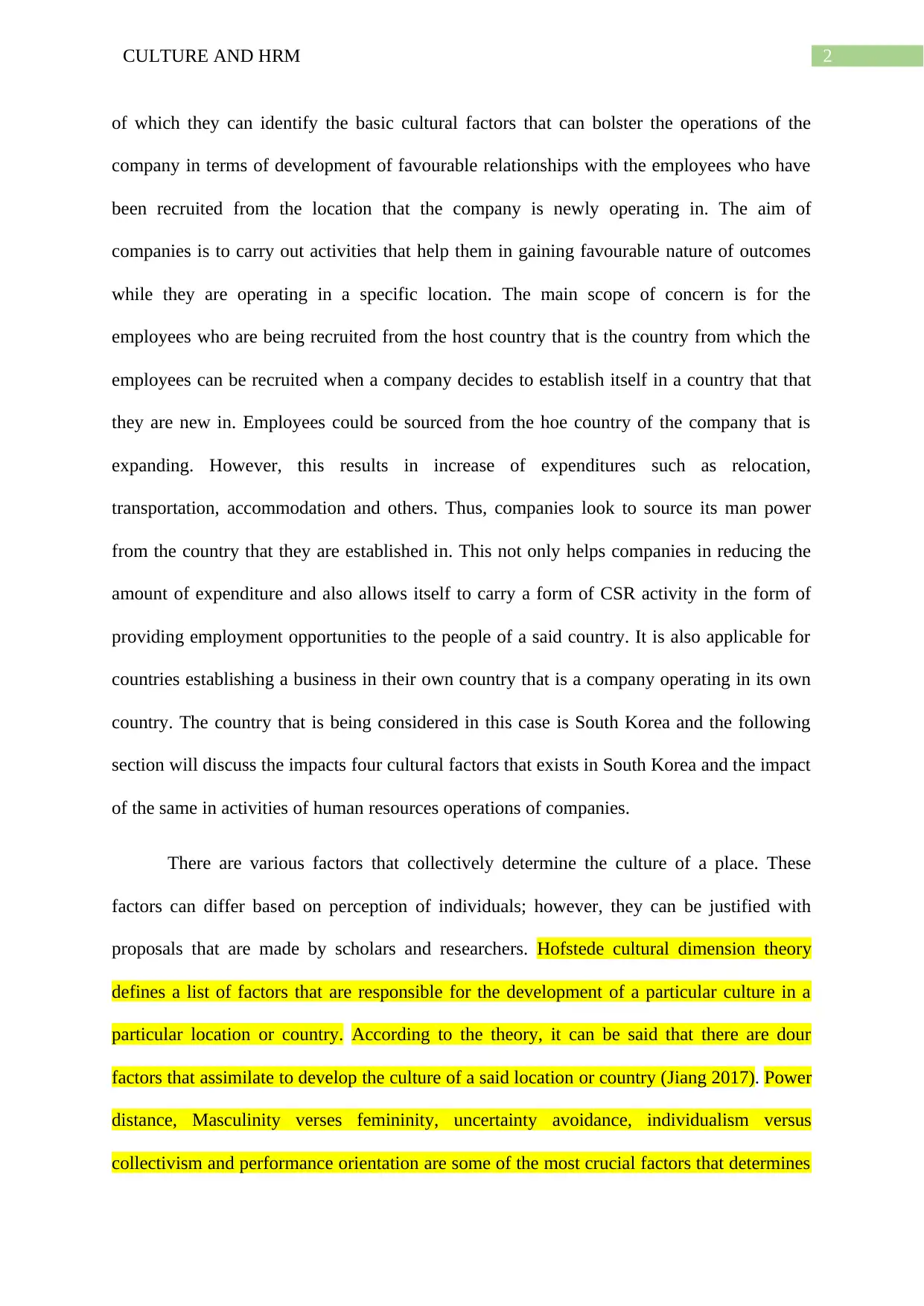
2CULTURE AND HRM
of which they can identify the basic cultural factors that can bolster the operations of the
company in terms of development of favourable relationships with the employees who have
been recruited from the location that the company is newly operating in. The aim of
companies is to carry out activities that help them in gaining favourable nature of outcomes
while they are operating in a specific location. The main scope of concern is for the
employees who are being recruited from the host country that is the country from which the
employees can be recruited when a company decides to establish itself in a country that that
they are new in. Employees could be sourced from the hoe country of the company that is
expanding. However, this results in increase of expenditures such as relocation,
transportation, accommodation and others. Thus, companies look to source its man power
from the country that they are established in. This not only helps companies in reducing the
amount of expenditure and also allows itself to carry a form of CSR activity in the form of
providing employment opportunities to the people of a said country. It is also applicable for
countries establishing a business in their own country that is a company operating in its own
country. The country that is being considered in this case is South Korea and the following
section will discuss the impacts four cultural factors that exists in South Korea and the impact
of the same in activities of human resources operations of companies.
There are various factors that collectively determine the culture of a place. These
factors can differ based on perception of individuals; however, they can be justified with
proposals that are made by scholars and researchers. Hofstede cultural dimension theory
defines a list of factors that are responsible for the development of a particular culture in a
particular location or country. According to the theory, it can be said that there are dour
factors that assimilate to develop the culture of a said location or country (Jiang 2017). Power
distance, Masculinity verses femininity, uncertainty avoidance, individualism versus
collectivism and performance orientation are some of the most crucial factors that determines
of which they can identify the basic cultural factors that can bolster the operations of the
company in terms of development of favourable relationships with the employees who have
been recruited from the location that the company is newly operating in. The aim of
companies is to carry out activities that help them in gaining favourable nature of outcomes
while they are operating in a specific location. The main scope of concern is for the
employees who are being recruited from the host country that is the country from which the
employees can be recruited when a company decides to establish itself in a country that that
they are new in. Employees could be sourced from the hoe country of the company that is
expanding. However, this results in increase of expenditures such as relocation,
transportation, accommodation and others. Thus, companies look to source its man power
from the country that they are established in. This not only helps companies in reducing the
amount of expenditure and also allows itself to carry a form of CSR activity in the form of
providing employment opportunities to the people of a said country. It is also applicable for
countries establishing a business in their own country that is a company operating in its own
country. The country that is being considered in this case is South Korea and the following
section will discuss the impacts four cultural factors that exists in South Korea and the impact
of the same in activities of human resources operations of companies.
There are various factors that collectively determine the culture of a place. These
factors can differ based on perception of individuals; however, they can be justified with
proposals that are made by scholars and researchers. Hofstede cultural dimension theory
defines a list of factors that are responsible for the development of a particular culture in a
particular location or country. According to the theory, it can be said that there are dour
factors that assimilate to develop the culture of a said location or country (Jiang 2017). Power
distance, Masculinity verses femininity, uncertainty avoidance, individualism versus
collectivism and performance orientation are some of the most crucial factors that determines
⊘ This is a preview!⊘
Do you want full access?
Subscribe today to unlock all pages.

Trusted by 1+ million students worldwide
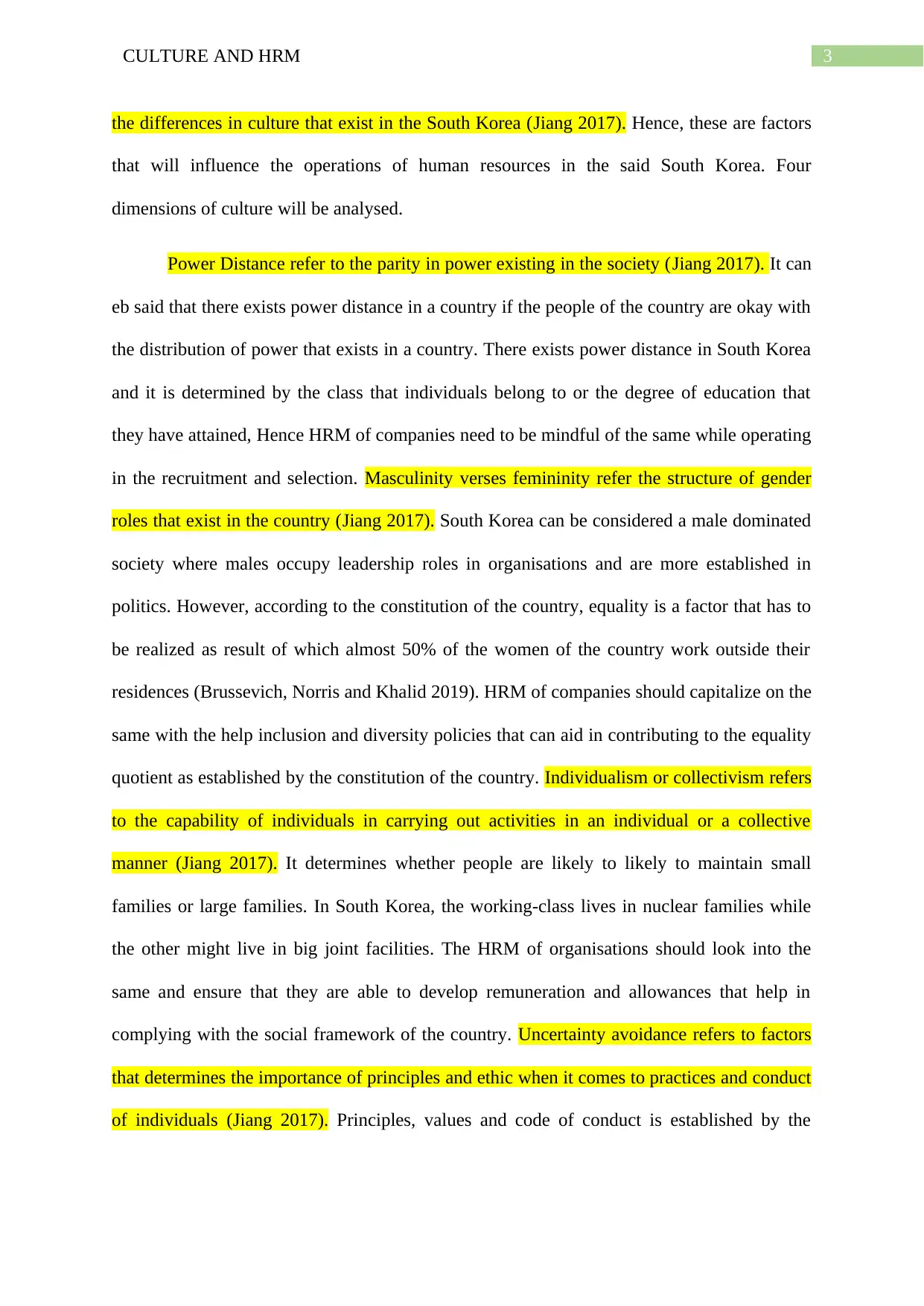
3CULTURE AND HRM
the differences in culture that exist in the South Korea (Jiang 2017). Hence, these are factors
that will influence the operations of human resources in the said South Korea. Four
dimensions of culture will be analysed.
Power Distance refer to the parity in power existing in the society (Jiang 2017). It can
eb said that there exists power distance in a country if the people of the country are okay with
the distribution of power that exists in a country. There exists power distance in South Korea
and it is determined by the class that individuals belong to or the degree of education that
they have attained, Hence HRM of companies need to be mindful of the same while operating
in the recruitment and selection. Masculinity verses femininity refer the structure of gender
roles that exist in the country (Jiang 2017). South Korea can be considered a male dominated
society where males occupy leadership roles in organisations and are more established in
politics. However, according to the constitution of the country, equality is a factor that has to
be realized as result of which almost 50% of the women of the country work outside their
residences (Brussevich, Norris and Khalid 2019). HRM of companies should capitalize on the
same with the help inclusion and diversity policies that can aid in contributing to the equality
quotient as established by the constitution of the country. Individualism or collectivism refers
to the capability of individuals in carrying out activities in an individual or a collective
manner (Jiang 2017). It determines whether people are likely to likely to maintain small
families or large families. In South Korea, the working-class lives in nuclear families while
the other might live in big joint facilities. The HRM of organisations should look into the
same and ensure that they are able to develop remuneration and allowances that help in
complying with the social framework of the country. Uncertainty avoidance refers to factors
that determines the importance of principles and ethic when it comes to practices and conduct
of individuals (Jiang 2017). Principles, values and code of conduct is established by the
the differences in culture that exist in the South Korea (Jiang 2017). Hence, these are factors
that will influence the operations of human resources in the said South Korea. Four
dimensions of culture will be analysed.
Power Distance refer to the parity in power existing in the society (Jiang 2017). It can
eb said that there exists power distance in a country if the people of the country are okay with
the distribution of power that exists in a country. There exists power distance in South Korea
and it is determined by the class that individuals belong to or the degree of education that
they have attained, Hence HRM of companies need to be mindful of the same while operating
in the recruitment and selection. Masculinity verses femininity refer the structure of gender
roles that exist in the country (Jiang 2017). South Korea can be considered a male dominated
society where males occupy leadership roles in organisations and are more established in
politics. However, according to the constitution of the country, equality is a factor that has to
be realized as result of which almost 50% of the women of the country work outside their
residences (Brussevich, Norris and Khalid 2019). HRM of companies should capitalize on the
same with the help inclusion and diversity policies that can aid in contributing to the equality
quotient as established by the constitution of the country. Individualism or collectivism refers
to the capability of individuals in carrying out activities in an individual or a collective
manner (Jiang 2017). It determines whether people are likely to likely to maintain small
families or large families. In South Korea, the working-class lives in nuclear families while
the other might live in big joint facilities. The HRM of organisations should look into the
same and ensure that they are able to develop remuneration and allowances that help in
complying with the social framework of the country. Uncertainty avoidance refers to factors
that determines the importance of principles and ethic when it comes to practices and conduct
of individuals (Jiang 2017). Principles, values and code of conduct is established by the
Paraphrase This Document
Need a fresh take? Get an instant paraphrase of this document with our AI Paraphraser
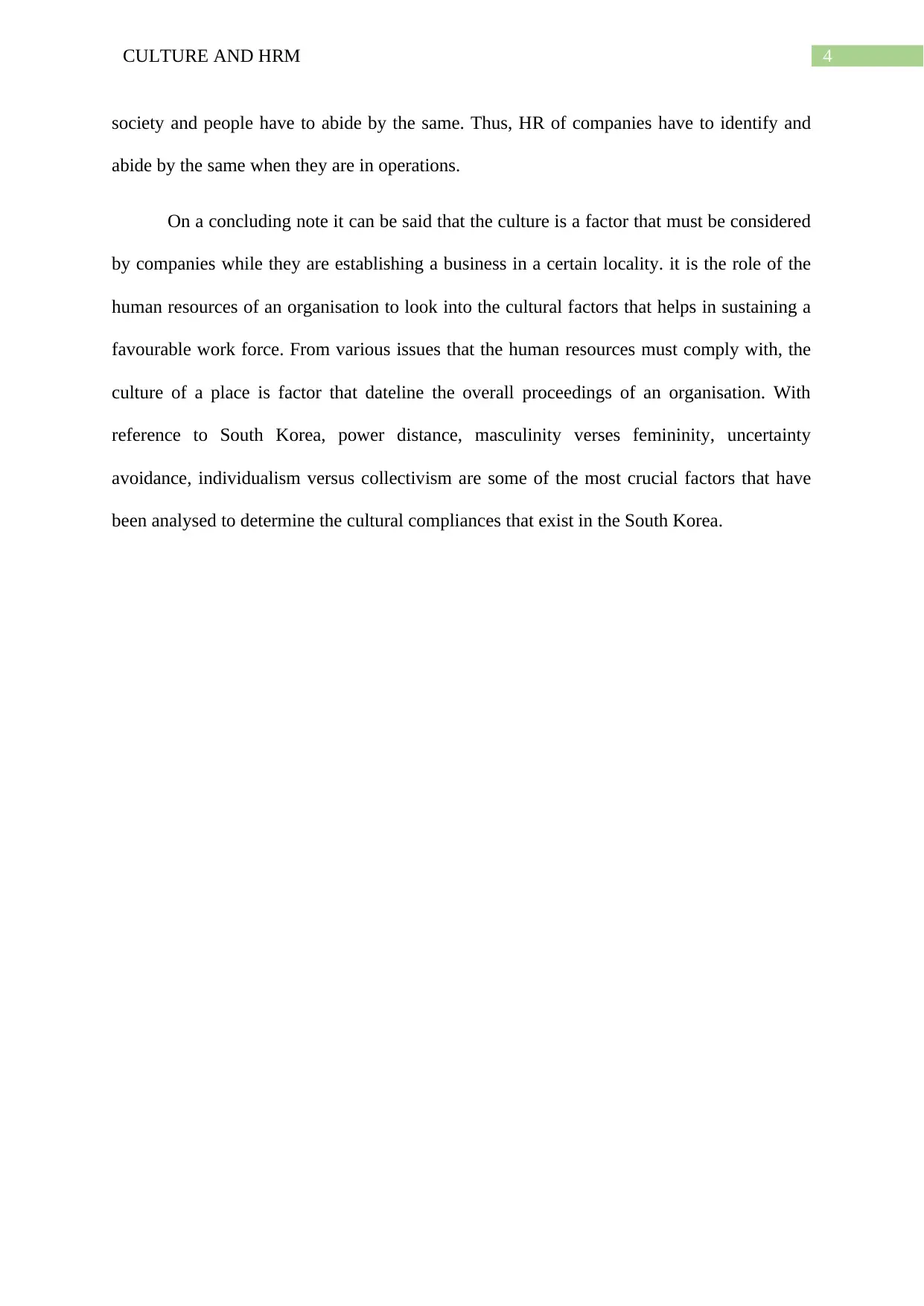
4CULTURE AND HRM
society and people have to abide by the same. Thus, HR of companies have to identify and
abide by the same when they are in operations.
On a concluding note it can be said that the culture is a factor that must be considered
by companies while they are establishing a business in a certain locality. it is the role of the
human resources of an organisation to look into the cultural factors that helps in sustaining a
favourable work force. From various issues that the human resources must comply with, the
culture of a place is factor that dateline the overall proceedings of an organisation. With
reference to South Korea, power distance, masculinity verses femininity, uncertainty
avoidance, individualism versus collectivism are some of the most crucial factors that have
been analysed to determine the cultural compliances that exist in the South Korea.
society and people have to abide by the same. Thus, HR of companies have to identify and
abide by the same when they are in operations.
On a concluding note it can be said that the culture is a factor that must be considered
by companies while they are establishing a business in a certain locality. it is the role of the
human resources of an organisation to look into the cultural factors that helps in sustaining a
favourable work force. From various issues that the human resources must comply with, the
culture of a place is factor that dateline the overall proceedings of an organisation. With
reference to South Korea, power distance, masculinity verses femininity, uncertainty
avoidance, individualism versus collectivism are some of the most crucial factors that have
been analysed to determine the cultural compliances that exist in the South Korea.
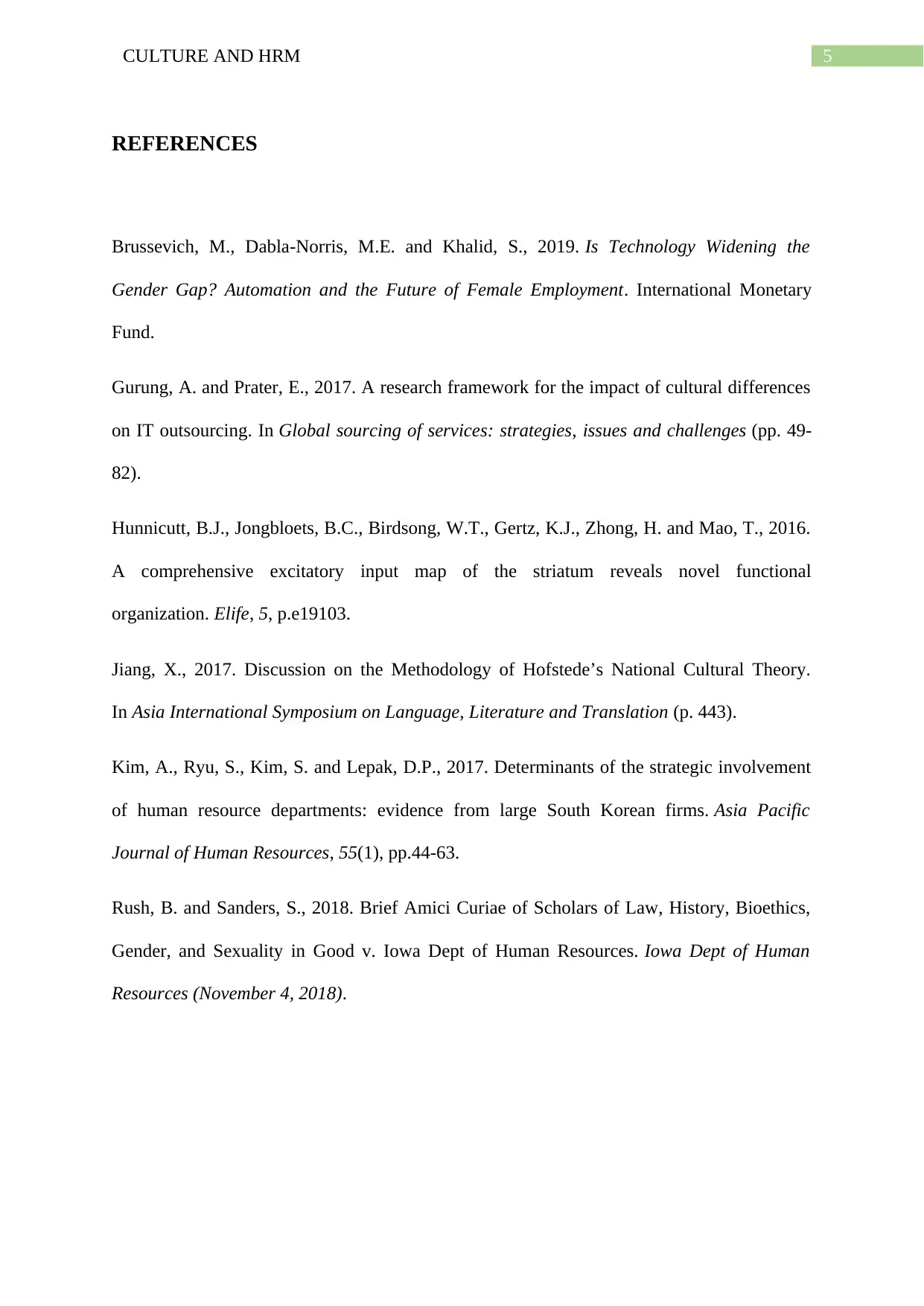
5CULTURE AND HRM
REFERENCES
Brussevich, M., Dabla-Norris, M.E. and Khalid, S., 2019. Is Technology Widening the
Gender Gap? Automation and the Future of Female Employment. International Monetary
Fund.
Gurung, A. and Prater, E., 2017. A research framework for the impact of cultural differences
on IT outsourcing. In Global sourcing of services: strategies, issues and challenges (pp. 49-
82).
Hunnicutt, B.J., Jongbloets, B.C., Birdsong, W.T., Gertz, K.J., Zhong, H. and Mao, T., 2016.
A comprehensive excitatory input map of the striatum reveals novel functional
organization. Elife, 5, p.e19103.
Jiang, X., 2017. Discussion on the Methodology of Hofstede’s National Cultural Theory.
In Asia International Symposium on Language, Literature and Translation (p. 443).
Kim, A., Ryu, S., Kim, S. and Lepak, D.P., 2017. Determinants of the strategic involvement
of human resource departments: evidence from large South Korean firms. Asia Pacific
Journal of Human Resources, 55(1), pp.44-63.
Rush, B. and Sanders, S., 2018. Brief Amici Curiae of Scholars of Law, History, Bioethics,
Gender, and Sexuality in Good v. Iowa Dept of Human Resources. Iowa Dept of Human
Resources (November 4, 2018).
REFERENCES
Brussevich, M., Dabla-Norris, M.E. and Khalid, S., 2019. Is Technology Widening the
Gender Gap? Automation and the Future of Female Employment. International Monetary
Fund.
Gurung, A. and Prater, E., 2017. A research framework for the impact of cultural differences
on IT outsourcing. In Global sourcing of services: strategies, issues and challenges (pp. 49-
82).
Hunnicutt, B.J., Jongbloets, B.C., Birdsong, W.T., Gertz, K.J., Zhong, H. and Mao, T., 2016.
A comprehensive excitatory input map of the striatum reveals novel functional
organization. Elife, 5, p.e19103.
Jiang, X., 2017. Discussion on the Methodology of Hofstede’s National Cultural Theory.
In Asia International Symposium on Language, Literature and Translation (p. 443).
Kim, A., Ryu, S., Kim, S. and Lepak, D.P., 2017. Determinants of the strategic involvement
of human resource departments: evidence from large South Korean firms. Asia Pacific
Journal of Human Resources, 55(1), pp.44-63.
Rush, B. and Sanders, S., 2018. Brief Amici Curiae of Scholars of Law, History, Bioethics,
Gender, and Sexuality in Good v. Iowa Dept of Human Resources. Iowa Dept of Human
Resources (November 4, 2018).
⊘ This is a preview!⊘
Do you want full access?
Subscribe today to unlock all pages.

Trusted by 1+ million students worldwide
1 out of 6
Related Documents
Your All-in-One AI-Powered Toolkit for Academic Success.
+13062052269
info@desklib.com
Available 24*7 on WhatsApp / Email
![[object Object]](/_next/static/media/star-bottom.7253800d.svg)
Unlock your academic potential
Copyright © 2020–2025 A2Z Services. All Rights Reserved. Developed and managed by ZUCOL.





